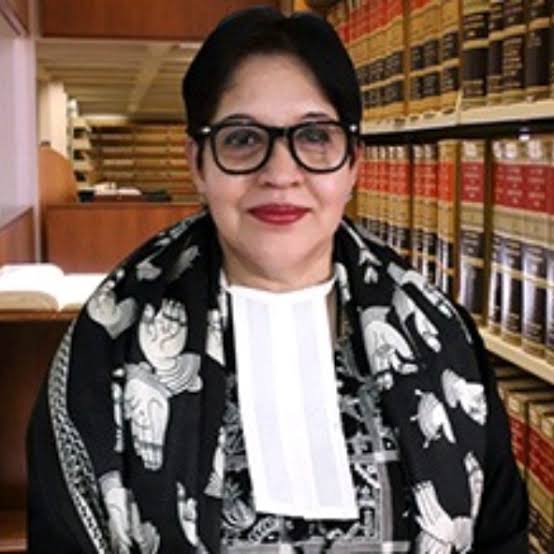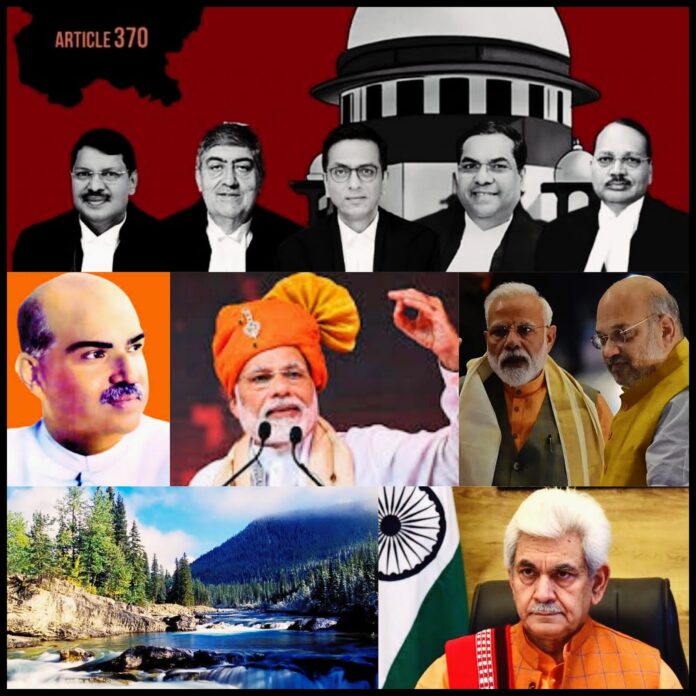
Prof. Neelam Mahajan Singh
The Supreme Court of India has fully supported the Narendra Modi Government on scrapping of Jammu and Kashmir’s ‘Special Status’ of Article 370 and 35-A. In 2019 the Centre notified scrapping the ‘Special Status’ and split the state into two Union Territories – Jammu-Kashmir and Ladakh. At the very outset the author humbly submits that she has been covering the political, social, economic and strategic developments of J.and K. for more than three decades. The author is titled; ‘Daughter of Kashmir’, born in Srinagar. I have courageously and boldly written articles and interpreted Kashmir’s issues, given suggestions to Centre, State, Governor and Lieutenant Governor. Let’s understand the issues in their perspective. Jan Sangh, founder, Dr. Shyama Prasad Mukherjee had categorically talked of scrapping Art. 370 and 35-A, so as to amalgamate Jammu-Kashmir, like other states of India. BJP was founded by Shyama Prasad Mukherjee, Atal Bihari Vajpayee and Lal Krishna Advani, all leading figures of the independent ‘Hindu Nationalist Movement’. Simply statating; there were three main objectives of the Bhartiya Janta Party; viz. abolition of ‘Special Status under Art. 370 and 35-A to Jammu-Kashmir and Ladakh’, implementing Uniform Civil Code and construction of Ram Temple in Ayodhya. This would ease the process of Hindutva ideology to be propagated at the grassroots level. Since 1981 till date all important objectives of BJP are actualized. Uniform Civil Code is yet not put to practice, due to strong opposition from minorities’ political parties.
Thus Prime Minister Narendra Modi took a bold and politically affirmative steps in announcing Jammu and Kashmir as a Union Territory, putting the same under Lt. Governor Manoj Sinha and giving a separate status to Ladakh. Multiple petitions had flooded the Supreme Court of India, with the petitioners arguing that Article 370 and 35-A cannot be scrapped unilaterally by the Central government. Article 370 of the Constitution of India, bestowed special status on the erstwhile state of Jammu-Kashmir, whic was a “temporary provision”, the Supreme Court ruled. In a landmark verdict, the court unanimously upheld the Centre’s August 5, 2019 decision to abrogate provisions of Article 370, while directing restoration of statehood for Jammu-Kashmir at the earliest and holding of the assembly elections by September 30, 2024.
The historical verdict was pronounced by a five-judge Constitutional Bench led by Chief Justice of India, Justice Dr. Dhananjay Yashwant Chandrachud, Justice Sanjay Kishan Kaul, Justice Sanjiv Khanna, Justice B.R. Gavai and Justice Surya Kant; in response to a slew of petitions challenging the Centre’s move four years ago. After 16 days long hearing, the Supreme Court reserved its judgment on September 5, 2023. When the Constituent Assembly ceased to exist, it meant only the proviso to Article 370(3) was ‘rendered otiose’. However, the petitioners argued that Article 370 cannot be scrapped unilaterally by the Centre, since the powers of the ‘Constituent Assembly were vested in Jammu and Kashmir Legislature, after it was dissolved in 1957’. “By abrogating Article 370, PM Narendra Modi has given strength to unity and integrity of India”, said J.P. Nadda, BJP President. Justice Chandrachud has said, “One can not challenge every decision of the Central Government”.
The Supreme Court however refused to stamp an approval on the validity of President’s Rule in Jammu and Kashmir – imposed in December 2018. Since it was not specifically challenged by the petitioners as part of an overall contesting of the scrapping of Special Status, under Article 370, to the former state. There may be opposition in the valley subsequent to this judgement.
The court seemed to warn against challenges to “decisions taken by the Union on behalf of the State (when President’s Rule is in effect) for day-to-day administration”, flagging possible “chaos”. Prime Minister Narendra Modi hailed the judgement as “a resounding declaration of hope, progress and unity for Jammu-Kashmir and Ladakh”, shortly after the Supreme Court struck down challenges to centre scrapping Special Status, under Article 370. PM Narendra Modi, Home Minister Amit Shah, Dr. Mohan Bhagwat, RSS Sarsanghchalak, have hailed the Supreme Court’s judgement, as unifying Jammu-Kashmir and Ladakh to be an integral part of India, like other states of the Union. J.K. BJP president Ravinder Raina hailed the Supreme Court’s verdict upholding the abrogation of Article 370, saying “we honour and respect the judgement in letter and spirit”. Ex CM and MP from Srinagar, President of JK National Conference, Dr. Farooq Abdullah said, “Let Jammu and Kashmir go to hell (bhad main jaye Jammu-Kashmir) while coming out of Parliament. It’s time for Dr. Abdullah to say ‘adieu to politics’ now! Ex-president of J-K Congress, G. A. Mir is silent on the judgment. Defence Minister Rajnath Singh called the Supreme Court’s decision to constitutionally validating the removal of Article 370 a “historic decision that is going to make every Indian happy”.
Dr. S. Jaishankar said, “Through this historic verdict, the Supreme Court has upheld the decision of the Parliament on 5 August 2019. In this time, Jammu-Kashmir and Ladakh have seen the development, good governance and empowerment that were long, their due”. This judgement portends a brighter future for our brothers and sisters in J.K. and Ladakh. The Modi Government should continue its relentless efforts to bringing more growth and development for the people of the valley. However, the Supreme Court has directed the Election Commission of India (EC) to hold elections in Jammu and Kashmir by September 30 next year. “Wounds require healing,” said Justice Kaul’s separate order on Article 370. Justice Sanjay Kishan Kaul called for an impartial investigation into human rights violations and abuses in Jammu and Kashmir since 1980s.
Omar Abdullah, ex C.M. of J.K. said, “Dil na-umeed to hai” after Supreme Court’s ruling. Omar felt highly dejected. On the same day the Delhi High Court refused to grant divorce to Omar Abdullah from his estranged wife, Payal Abdullah. Omar said, he needs some reclusion to overcome these disheartening rulings. Rightly so! The Democratic Progressive Azad Party (DPAP) chairman, Ghulam Nabi Azad, ex CM of the state called the verdict “sad and unfortunate, as the people of the region are not happy but we have to accept it”. President of PDP, Mehbooba Mufti said, “The people of Jammu-Kashmir are not going to lose hope or give up. Our fight for honour and dignity will continue regardless. This isn’t the end of the road for us. This is the loss of the idea of India. The hand that you held has been wounded,” she said in a video message posted on X. Justice Kaul said that, “It is for the government to decide the manner in which way it would work. I recommend the setting up of an impartial Truth and Reconciliation Committee to investigate and report on the violation of human rights both by the State and non-state actors at least since 1980s and recommend measures for reconciliation”.
The Commission must be set up before memory escapes. The exercise must be time-bound. There is an entire generation of youth that has grown up with a feeling of distrust and it is to them that we owe the day of liberation. In my epilogue, I said, “To move forward, wounds require healing, inter-generational trauma is felt by people. The first step towards healing the wounds is the acknowledgement of the acts of violations done by the State and its actors”. In retrospect, it may be concluded that, the State of Jammu and Kshmir does not retain any element of isolated sovereignty. Article 370 is a feature of asymmetric federalism and not soveriengty. Petitioners did not challenge Presidential Proclamation. Exercise of President’s power after the proclamation are subject to judicial review. Power of Parliament under Article 356(1) to exercise powers on behalf of State assembly is not restricted to law making powers. Article 370 is a temporary power.
Power under Article 370(3) did not cease after the Jammu-Kashmir Constituent Assembly ceased to exist. The principle of consultation and collaboration was not required to be followed for the exercise of Presidential power. While Jammu-Kashmir and Ladakh are border areas touching Pakistan and China, the Central Government ought to give top priority to security forces. Further let the period of militancy, arson, conflict, stone pelting, barbaric and bloody killing of armed forces personnel, innocent citizens, government officials and entrepreneurs, being killed; should come to an end. I have repeatedly stated that when geographically Jammu-Kashmir and Ladakh are a part of India, the people of Kashmir are also very much Indians. The people of the valley need to change their mindset towards negativity. Give peace, prosperity and happiness a chance to the snow-clad Jammu-Kashmir. Let the sunshine of Insaniyat, Kasmiriyat and Jamhuriat enlighten the valley. ‘Gar firdaus bar-rue zamin asto, hami asto, hamin asto, hamin asto’; Amir Khusro rightly wrote, if there’s any heaven on earth, it’s here in Kashmir’! The people of India, PM Narendra Modi’s Government, Justice Dr. Dhananjay Yashwant Chandrachud and his brother judges, the petitioners, we are all Indians. Let’s dump our differences and give our great nation, a chance to prove that we are all one! ‘We the people of India’!
(Writer is Sr. Journalist, Expert on Kashmir Affairs, Author, Doordarshan Personality, Solicitor For Human Rights Protection and Philanthropist)


